|
|
Our Holy Father Pimen the Great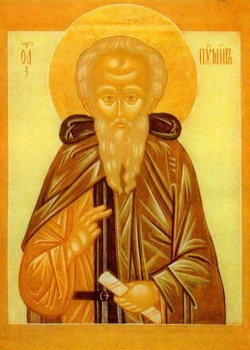 He was an Egyptian by birth and a great Egyptian ascetic. As a boy, he visited various spiritual teachers and gathered proven experience as a bee gathers honey from flowers. Pimen once begged the elder Paul to take him to St Paisius. Seeing him, Paisius said: "This child will save many; the hand of God is on him." In time, Pimen became a monk and drew two of his brothers to monasticism. Their mother once came to see her sons, but Pimen would not allow her in, asking through the door: "Which do you want more: to see us here and now, or in the other world in eternity?" Their mother went away joyfully, saying: "If I will see you for certain there, I don"t need to see you here." In the monastery of these three brothers, governed by the eldest, Abba Anoub, the rule was as follows: at night, four hours were passed in manual work, four hours in sleep and four in reading the Psaiter. The day was passed, from morning to noon, in alternate work and prayer, from mid-day to Vespers in reading and after Vespers they prepared their meal, the only one in the twenty-four hours, and this usually of some sort of cabbage. Pimen himself said about their life: "We ate what was to hand. No-one ever said: "Give me something else", or "I won"t eat that". In that way, we spent our whole life in silence and peace." He lived in the fifth century, and entered peacefully into rest in great old age. He was an Egyptian by birth and a great Egyptian ascetic. As a boy, he visited various spiritual teachers and gathered proven experience as a bee gathers honey from flowers. Pimen once begged the elder Paul to take him to St Paisius. Seeing him, Paisius said: "This child will save many; the hand of God is on him." In time, Pimen became a monk and drew two of his brothers to monasticism. Their mother once came to see her sons, but Pimen would not allow her in, asking through the door: "Which do you want more: to see us here and now, or in the other world in eternity?" Their mother went away joyfully, saying: "If I will see you for certain there, I don"t need to see you here." In the monastery of these three brothers, governed by the eldest, Abba Anoub, the rule was as follows: at night, four hours were passed in manual work, four hours in sleep and four in reading the Psaiter. The day was passed, from morning to noon, in alternate work and prayer, from mid-day to Vespers in reading and after Vespers they prepared their meal, the only one in the twenty-four hours, and this usually of some sort of cabbage. Pimen himself said about their life: "We ate what was to hand. No-one ever said: "Give me something else", or "I won"t eat that". In that way, we spent our whole life in silence and peace." He lived in the fifth century, and entered peacefully into rest in great old age.Our Holy Father Pimen of Palestine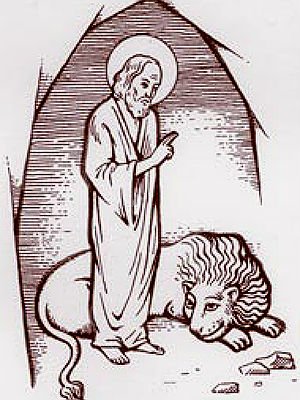 He lived the ascetic life in Rouba, in the Palestinian desert, in the time of the Emperor Maurice (582-602), and was a shepherd in his youth. Once his dogs fell on a man and tore him to pieces, and he, from capriciousness, did not try to save him. It was revealed to him that, because of this, he would, in the end, be devoured by wild beasts. So it came to pass: he was so devoured, and gave his soul into God"s hands. He lived the ascetic life in Rouba, in the Palestinian desert, in the time of the Emperor Maurice (582-602), and was a shepherd in his youth. Once his dogs fell on a man and tore him to pieces, and he, from capriciousness, did not try to save him. It was revealed to him that, because of this, he would, in the end, be devoured by wild beasts. So it came to pass: he was so devoured, and gave his soul into God"s hands.St Hosius of Cordova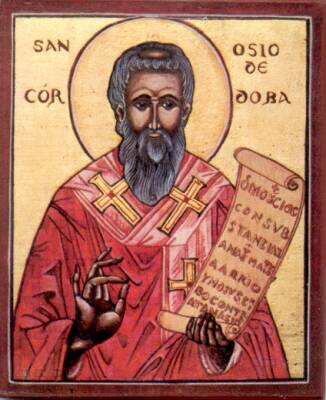 He governed the Church in Spain as Bishop of Cordova for over sixty years, and played a prominent part in the First Ecumenical Council in Nicaea. He also presided at the local Council in Sardica in 343. He was so zealous for Orthodoxy that, at the time of his death, he renewed the anathema against the Arian heresy. He governed the Church in Spain as Bishop of Cordova for over sixty years, and played a prominent part in the First Ecumenical Council in Nicaea. He also presided at the local Council in Sardica in 343. He was so zealous for Orthodoxy that, at the time of his death, he renewed the anathema against the Arian heresy.The Hieromartyr Kuksha and Pimen the Faster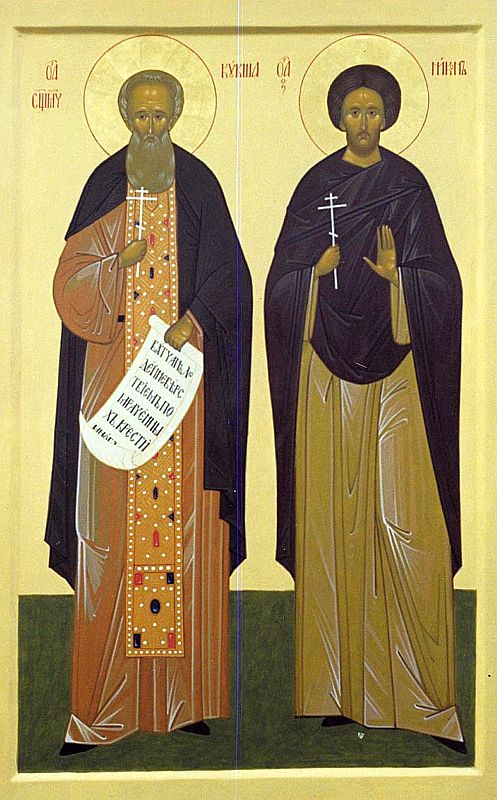 They were both monks of the Monastery of the Caves in Kiev. Kuksha was successful in preaching the Gospel to the Wallachians and in baptising them. One day, pagans fell on him and killed him, together with his disciple. At that moment, Pimen the Faster was standing in the church in the Monastery of the Caves and, seeing in his spirit the death of his disciple and friend Kuksha, cried out: 'Our brother Kuksha has today been killed for the Gospel!' Thus saying, he also breathed his last. This was in 1113.
In the Greek Great Synaxarion, the Holy Martyr Phanurius is also commemorated. Who he was and when he lived is not known, but he is much venerated in Rhodes and Crete. In 1500, he appeared to some people on the island of Rhodes, where he also showed wonders of healing. There is found there an old icon of him, in which he is depicted as a young soldier holding a cross in his right hand and a burning candle in his left. St Phanurius is also much venerated in Egypt. There is a tradition that his mother was a great sinner, whom not even he could convert. But his filial love for his mother was great beyond measure, and he prayed more for his mother's salvation than his own. When the pagans stoned him to death for Christ, St Phanurius prayed to God: 'For the sake of these my sufferings, Lord, help all those who will pray to Thee for the salvation of Phanurius's sinful mother.' In Egypt, many Christians pray thus: "O Lord, save Ohanurius's mother and help me, a sinner" - and many receive help through this prayer. They were both monks of the Monastery of the Caves in Kiev. Kuksha was successful in preaching the Gospel to the Wallachians and in baptising them. One day, pagans fell on him and killed him, together with his disciple. At that moment, Pimen the Faster was standing in the church in the Monastery of the Caves and, seeing in his spirit the death of his disciple and friend Kuksha, cried out: 'Our brother Kuksha has today been killed for the Gospel!' Thus saying, he also breathed his last. This was in 1113.
In the Greek Great Synaxarion, the Holy Martyr Phanurius is also commemorated. Who he was and when he lived is not known, but he is much venerated in Rhodes and Crete. In 1500, he appeared to some people on the island of Rhodes, where he also showed wonders of healing. There is found there an old icon of him, in which he is depicted as a young soldier holding a cross in his right hand and a burning candle in his left. St Phanurius is also much venerated in Egypt. There is a tradition that his mother was a great sinner, whom not even he could convert. But his filial love for his mother was great beyond measure, and he prayed more for his mother's salvation than his own. When the pagans stoned him to death for Christ, St Phanurius prayed to God: 'For the sake of these my sufferings, Lord, help all those who will pray to Thee for the salvation of Phanurius's sinful mother.' In Egypt, many Christians pray thus: "O Lord, save Ohanurius's mother and help me, a sinner" - and many receive help through this prayer.St. Liberius, pope of Rome (366)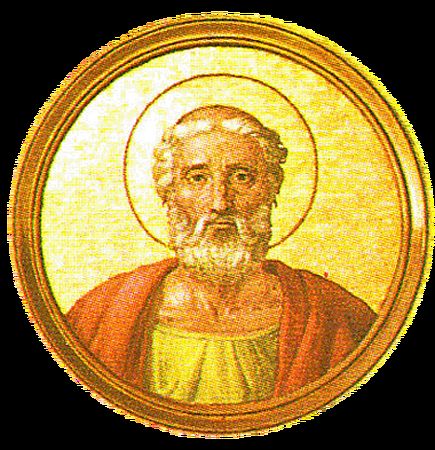 Sainted Liberius the Confessor, Pope of Rome, entered upon the papal throne in the year 352, after the death of Pope Julius. Saint Liberius was a fervent proponent of Orthodoxy against the Arian heresy and a defender of Saint Athanasias of Alexandria (Comm. 2 May). The emperor Constantius (337-361), inclining to side with the Arians, was not able to compel Saint Liberius to make a judgement against Saint Athanasias nor therefore against Orthodoxy... Sainted Liberius the Confessor, Pope of Rome, entered upon the papal throne in the year 352, after the death of Pope Julius. Saint Liberius was a fervent proponent of Orthodoxy against the Arian heresy and a defender of Saint Athanasias of Alexandria (Comm. 2 May). The emperor Constantius (337-361), inclining to side with the Arians, was not able to compel Saint Liberius to make a judgement against Saint Athanasias nor therefore against Orthodoxy...Great-martyr Phanurius the Newly Appeared of Rhodes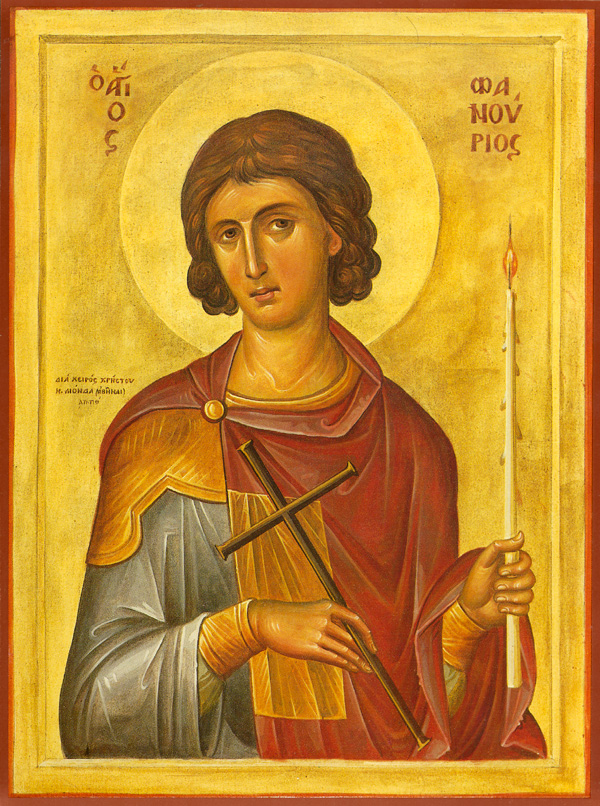 "Little is known of the holy Martyr Phanurius, except that which is depicted concerning his martyrdom on his holy icon, which was discovered in the year 1500 among the ruins of an ancient church on Rhodes, when the Moslems ruled there. Thus he is called "the Newly-Revealed." The faithful pray to Saint Phanurius especially to help them recover things that have been lost, and because he has answered their prayers so often, the custom has arisen of baking the Phaneropita ('Phanarius-Cake') as a thank-offering."... "Little is known of the holy Martyr Phanurius, except that which is depicted concerning his martyrdom on his holy icon, which was discovered in the year 1500 among the ruins of an ancient church on Rhodes, when the Moslems ruled there. Thus he is called "the Newly-Revealed." The faithful pray to Saint Phanurius especially to help them recover things that have been lost, and because he has answered their prayers so often, the custom has arisen of baking the Phaneropita ('Phanarius-Cake') as a thank-offering."...Venerable Sabbas of Benephali
Martyr Anthusa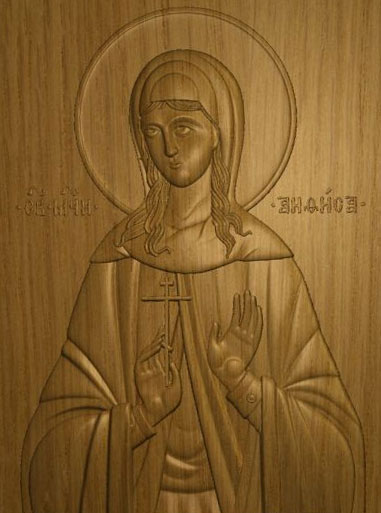 Martyr Anthusa, was thrown into a deep artesian well for her faith in Christ. In regard to others she is called the New, but when she practiced asceticism is not known. Martyr Anthusa, was thrown into a deep artesian well for her faith in Christ. In regard to others she is called the New, but when she practiced asceticism is not known. |